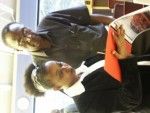CSA Sponsors Celebration

Kamau Brathwaite has been writing creatively for longer than I’ve been alive – and I’m no spring chicken…” Professor of History and Africana and Latin American Studies Brian Moore said when he introduced the internationally renowned poet to an audience of Colgate faculty and students. Moore is a former student of Brathwaite’s. Therefore, a little mockery on his part was all in good fun.Brathwaite was invited to Colgate as a guest lecturer, and his presence was just one component of a broader initiative: Caribbean Week. The program was sponsored by the Caribbean Students Association (CSA) and featured a host of different events.”It has become a tradition for the Caribbean Students Association to sponsor an annual Caribbean Week. This week is geared towards education of the Colgate community about the history of the Caribbean as an integral part of the Americas…” Co-Prime Minister of the Caribbean Students Association sophomore Amelia Thompson said. “This is really our equivalent of Black History Month or Asian Awareness Month and is just a small taste each year of the cultural and historical wealth of the Caribbean that many people might not necessarily be aware of in the presence of a large number of stereotypes surrounding the region.” The first event was a student symposium that featured a panel of student speakers. Juniors Will Gaughan and Frank Badalato and sophomores Ben Jones and Gideon Hart each discussed historical issues that affected the Caribbean. Among these issues was the rise of brutal structures of government in the Caribbean, a grave result of the slavery system that existed during the Caribbean’s colonial era. The study group that traveled to Trinidad and Tobago last semester also gave a presentation on their experiences in the West Indies. They highlighted several topics, including the various people they met, the Orisha Feast and Diwali.”We also try to do our best to incorporate students who are not necessarily from the Caribbean to take part in educating the Colgate community,” Thompson said. “These students, who have taken courses on the Caribbean or experienced it first-hand through the study group, have a unique perspective all their own that we feel is important to share.”The subsequent events involved Brathwaite. The Caribbean-born poet and historian has been published extensively throughout his career. He pursued his education at a multitude of institutions, such as Pembroke College at Cambridge, and he received his Ph.D. from the University of Sussex. Brathwaite worked in the realm of academia for many years. He taught at the University of the West Indies and is currently a Professor of Comparative Literature at New York University. His many awards include the Cholmondely Award, Guggenheim and Fulbright fellowships and the Neustadt Prize.Moore commented that Brathwaite’s diverse background is a part of his works. “It would be true to say that Kamau’s work is intimately linked with his own life patterns, which are themselves a reflection of the passage that the Afro-Caribbean people have gone through,” Moore said. “Born in Barbados, he lived in Ghana, South Africa, Jamaica, the United Kingdom and the United States…He is a part of that continuously Diasporic movement- or migration- that has characterized African-American and African-Caribbean life.”Brathwaite read some of his poetry and delivered a lecture entitled “From Person to Poet to Performer to Prophet: The Postmodern Ideal in Emergency Caribbean Poetry.”One of the poems he shared was “Calypso,” a name deriving from a unique West Indian-style of music. “Calypso” was one of his earlier poems and was an essential learning experience for Brathwaite. “The thing about this poem is that it allows me to learn about myself,” he said. “The poem itself began to teach me things I didn’t know. For instance, it taught me that Calypso is at the root of Caribbean poetry.”Indeed, music was reflected in his reading: Brathwaite rapped the podium as he practically sang the poem’s verse. This kind of performance is characteristic of Caribbean culture. “We in the Caribbean tend to be kinetic,” Brathwaite said. “We tend to use the body. The performance seems to me to be a very important aspect of the poetry. In other words, the concept of the total experience and the total expression of it is what we tend to go in for. Therefore, the most influential artists in the Caribbean have developed into performers.”Brathwaite also noted the significance of history on his own works. Specifically, he addressed the centuries of slavery that traumatized the Caribbean. Much of what he discussed dealt with the West Indies’ historically oppressive system. “Kamau has never really separated his history from his poetry. The two have always been integrated in his work,” Moore said. “His poetry is driven by his history, and his history writing … has been influenced by his poetic style.”First-year Zwena McLeod enjoyed his lecture. “Many people may not know who Kamau Brathwaite is,” she said. “I did not know who Kamau Brathwaite was before CSA decided to bring him to campus… However, I was glad that I went to his lecture. He is truly a talented and knowledgeable man.”Caribbean Week continued Thursday with a book signing with Moore. He and his colleague, Michele A. Johnson, launched their new book, Neither led nor Driven: Contesting British Cultural Imperialism in Jamaica.Caribbean Week will end with a special church service on Sunday at 11:00 a.m. The service will be hosted by CSA Senior Advisor Stephanie Thomas.




